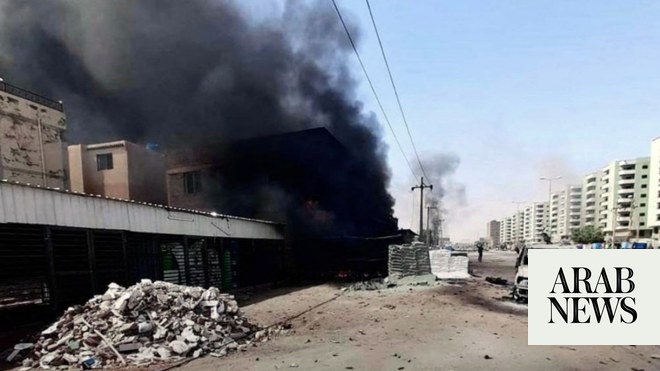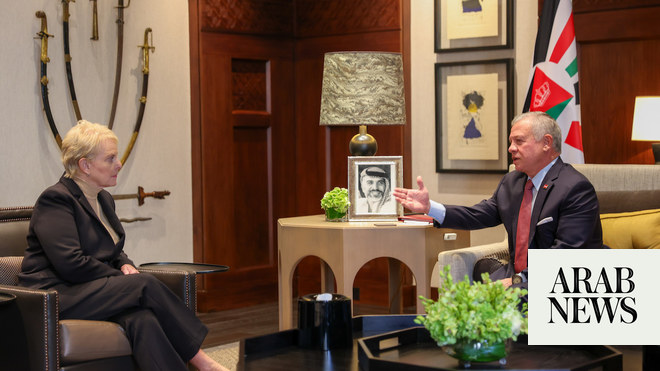
Parliament approves Johnson’s request to call back MPs for urgent debate on what UK should do next
Conservative MP Tobias Ellwood, chairman of the Commons Defense Committee, urged Johnson to “think again” about stepping in
LONDON: Nobody should bilaterally recognise the Taliban as the government of Afghanistan, British Prime Minister Boris Johnson said on Sunday, adding it was clear that there would be a new administration in the country very shortly.
"We don"t want anybody bilaterally recognising the Taliban," Johnson said in an interview clip, urging the West to work together on Afghanistan through mechanisms such as the United Nations and NATO.
"We want a united position amongst all the like-minded as far as we can get one so that we do whatever we can to prevent Afghanistan lapsing back into being a breeding ground for terror."
Taliban insurgents entered Kabul on Sunday, President Ashraf Ghani left the country and the US Embassy said the capital"s airport, where diplomats, officials and other Afghans had fled, had come under fire.
"The (UK) ambassador is working round the clock, has been there at the airport to help process the applications," said Johnson.
Asked whether he would have expected the country to fall to the Taliban so quickly, he replied:
"I think it"s fair to say that the US decision to pull out has accelerated things."
Earlier, a Downing Street spokesperson said Johnson had called a meeting of the COBR emergencies committee to discuss the situation in Afghanistan.
Parliament on Sunday said it had approved Johnson’s request to call back MPs on Wednesday for urgent debate on what Britain, which lost 457 troops in the two-decade long war, should do next.
Taliban fighters entered Kabul on Sunday, leading to British politicians to call for a last-ditch intervention.
Conservative MP Tobias Ellwood, chairman of the Commons Defense Committee, urged Johnson to “think again” about stepping in.
“We have an ever-shrinking window of opportunity to recognize where this country is going as a failed state,” he told Times Radio.
“Just because the Americans won’t, does not mean to say that we should be tied to the thinking, the political judgment — particularly when it is so wrong — of our closest security ally.
“We could prevent this, otherwise history will judge us very, very harshly in not stepping in,” he warned.
Ellwood said the government could deploy the Royal Navy’s HMS Queen Elizabeth carrier strike group to provide air support.
He called the crisis “the biggest single policy disaster since Suez.”
Johnson vowed on Friday that Britain will not “turn our backs” on Afghanistan, even as he confirmed the imminent withdrawal of most embassy staff in the face of a rapid Taliban onslaught.
However, he said that those calling for an intervention “have got to be realistic about the power of the UK or any power to impose a military solution — a combat solution — in Afghanistan.”
With the Islamists seizing control of more Afghan cities, Britain is deploying around 600 troops to help evacuate its roughly 3,000 nationals from the country, and Johnson said the “vast bulk” of remaining embassy staff in Kabul would return to the UK.
The Foreign Office said on Sunday that Britain had “temporarily suspended most operations” at its embassy in Kabul and was doing “all we can to enable remaining British nationals, and those Afghans who have worked for us and who are eligible for relocation, to leave Afghanistan.”
Opposition Labour leader Keir Starmer backed the move to recall parliament, saying in a statement: “The situation in Afghanistan is deeply shocking and seems to be worsening by the hour.
“The government has been silent while Afghanistan collapses, which let’s be clear will have ramifications for us here in the UK.
“We need parliament recalled so the government can update MPs on how it plans to work with allies to avoid a humanitarian crisis and a return to the days of Afghanistan being a base for extremists.”
Most of the remaining British troops assigned to the NATO mission in Afghanistan left last month, according to Johnson.
As well as the fallen troops, the conflict has cost Britain around £40 billion ($55 billion, 46.7 billion euros).
In 2014, the British mission in Afghanistan, centered on the restive southern province of Helmand, shifted from a combat operation to one focused on supporting Afghan national forces, with the help of around 750 troops.












